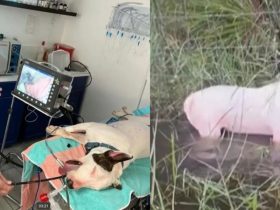BOCA RATON, Fla. — Scientists at Florida Atlantic University are set to investigate how exposure to smoke from agricultural fires could impact the risk of Alzheimer’s disease and related cognitive disorders in rural Palm Beach County.
The university, in collaboration with partners, has secured a substantial $4.2 million federal grant for a focused study on individuals residing in rural areas near Lake Okeechobee, close to the fields where pre-harvest burning takes place.
Tiny particles, referred to as Particular Matter 2.5 or P.M., become suspended in the air when agricultural smoke is inhaled. These particles can penetrate deep into the lungs, potentially reaching the brain and causing inflammation, a recognized risk factor for Alzheimer’s disease, explained Dr. Christine Williams, a distinguished professor at FAU.
Numerous prior studies have strongly indicated that the practice of burning sugarcane has detrimental effects on air quality in South Florida, leading to respiratory issues.
Recently, aerial footage from CBS12 News revealed substantial plumes of smoke billowing over vast acres of fields. Farmers engage in controlled burns from October to May as part of their pre-harvest routine.
Although these practices are regulated by the state, the resulting smoke and particles often drift into nearby communities such as Belle Glade, South Bay, and Pahokee.
Residents in these areas have voiced their concerns. Marilyn Jackson, a resident, shared, “I make an effort to stay indoors until the burning is over.” Yahyda Viera added, “My brother has asthma, and his condition worsens when it starts burning.”
The federal initiative intends to closely monitor instances of periodic air pollution both on the ground and through satellite observations. More than a thousand elderly residents within these rural neighborhoods will be tracked for a duration of three to five years. Their physical activities and cognitive functions will be recorded using smartwatches.
Dr. Lisa Wiese, an associate professor and the lead researcher at FAU, emphasized the objective of identifying individual, communal, and environmental factors contributing to cognitive decline in rural settings. She noted that hypertension, diabetes, and chronic illnesses are additional risk factors prevalent in these communities.
This endeavor marks another local endeavor aimed at combatting this devastating ailment. Dr. Williams, driven by personal experience as her mother suffered from Alzheimer’s, expressed the team’s desire to educate people about healthy lifestyles that can aid in preventing the disease.
The project is slated to commence training, participant selection, and expert recruitment in early 2024.
Dr. Wiese conveyed, “It’s an honor to collaborate with them. We aim to assist these individuals in aging within their familiar surroundings and avoiding the institutionalization often associated with untreated dementia.”
For further information, please click here.












Leave a Reply